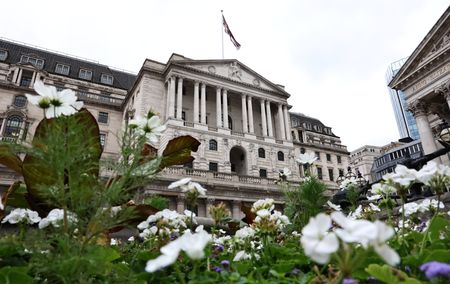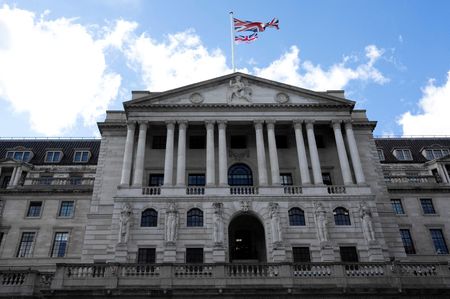LONDON, Aug 7 (Reuters) – The Bank of England said on Thursday it estimates that its bond selling programme may have added as much as a quarter of a percentage point to the cost of 10-year British government borrowing, slightly more than it thought a year ago.
Britain’s central bank has reduced the 875 billion pounds of gilts which it bought between 2009 and 2021 by more than 300 billion pounds since 2022, through a mix of bond sales and allowing existing bonds to mature.
Each August the BoE assesses the impact of the programme over the past year before its Monetary Policy Committee in September sets the pace at which bond holdings should fall over the following 12 months.
Since October 2024 the BoE has reduced its holdings by 100 billion pounds – largely due to the 87 billion pounds of gilts which matured. Market partipants polled by the BoE earlier this year expected the stockpile to drop by 75 billion pounds over the coming 12 months.
In a report published after its August MPC meeting, the BoE revised up its estimate of the cumulative impact of its quantiative tightening programme on 10-year gilt yields to 0.15-0.25 percentage points from 0.1-0.2 percentage points a year ago, which it said reflected the extra QT conducted over the past year.
Ten-year gilt yields have risen by about 3.25 percentage points since the start of QT in February 2022 and by 0.55 percentage points over the past year.
Thirty-year gilt yields have risen more sharply, however, up by nearly a full percentage point over the last 12 months, and some economists think the BoE could skew its sales in the coming year away from these gilts, or even stop them entirely.
The BoE’s assessment did not address this possiblity directly but noted that its sales of long-dated gilts could have a bigger impact on liqudity due to reduced demand in the market from pension funds.
“These same shifts in the gilt market could pose a risk that QT has a greater impact on market functioning than previously. In an environment with lower demand for long-term assets, QT could have a larger impact on market liquidity,” it said.
Keywords: BRITAIN BOE/QT











